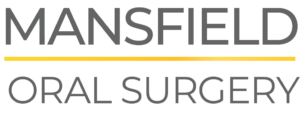Getting oral surgery can feel intimidating, but the right anesthesia makes all the difference. Whether you’re nervous about discomfort or unsure what to expect, knowing the types of dental anesthesia can give you peace of mind before your procedure.
At Mansfield Oral Surgery, board-certified oral and maxillofacial surgeon Dr. Franklin Awah takes patient comfort seriously. With advanced training in anesthesia and a reputation for compassionate care, he helps you understand your options and feel at ease, every step of the way.
Why Anesthesia Matters in Oral Surgery
Anesthesia is more than just “numbing.” It allows your oral surgeon to perform precise procedures, like wisdom teeth removal or dental implant placement, without pain or stress.
The right anesthesia also reduces anxiety, prevents movement during surgery, and helps with a smoother recovery. It’s an essential part of oral surgery that can be personalized to each patient’s needs.
Types of Dental Anesthesia Used at Mansfield Oral Surgery
We offer a variety of anesthesia options for oral surgery, depending on the procedure and your comfort level:
- Local Anesthesia:
This numbs a small area of the mouth. You’re fully awake, but you won’t feel pain. Best for simple procedures like single dental anesthesia for tooth extraction. - Nitrous Oxide (Laughing Gas):
Breathed in through a mask, this mild sedation helps you relax. The effects wear off quickly, making it a great option if you want to drive yourself home. - Oral Sedation:
Taken as a pill before surgery, this offers deeper relaxation. You’re awake but drowsy and less aware of the procedure. - IV Sedation:
Delivered through a vein, IV sedation is stronger than oral sedation and ideal for longer or more complex procedures, especially for wisdom teeth removal. - General Anesthesia:
You’ll be completely unconscious and monitored throughout. This is reserved for lengthy surgeries or patients with high anxiety levels.
How We Determine the Right Option for You
Dr. Awah doesn’t take a one-size-fits-all approach. With a dual degree in dentistry and medicine and over a decade of surgical experience, he’s trained to match patients with the best sedation method for nervous dental patients and complex cases alike.
During your consultation, we’ll ask about your:
- Medical history and medications
- Pain tolerance
- Level of anxiety
- Type of surgery needed
This personalized assessment helps us provide you with the safest and most effective solution.
Safety and Monitoring During Anesthesia
A common question we hear is: How safe is dental anesthesia? Rest assured, safety is our top priority. Every procedure is done under strict monitoring. We continuously track your:
- Heart rate
- Blood pressure
- Breathing
- Oxygen levels
Dr. Awah’s extensive training in anesthesia, combined with state-of-the-art equipment and a highly trained team, ensures you’re in expert hands.
What to Expect Before and After Sedation
Each type of anesthesia comes with different pre- and post-op instructions. Before sedation, we may ask you to:
- Avoid food and drink for six to eight hours
- Arrange for a ride home if you’re receiving oral, IV, or general anesthesia
- Discuss your medications in advance
After the procedure, depending on the sedation used, you may:
- Feel sleepy or slightly disoriented
- Be advised to rest for the remainder of the day
- Receive instructions for eating, drinking, and taking medications
Most patients bounce back quickly, especially with lighter options like nitrous oxide or local anesthesia.
Schedule a Consultation
If you’re planning oral surgery and unsure about sedation, let’s talk. Dr. Awah and the team at Mansfield Oral Surgery are here to guide you with clarity, empathy, and expert care. Whether you’re preparing for a simple extraction or need full sedation, we’ll help you make the right choice for your comfort and safety.
Schedule your consultation today for confident, pain-free care.




Testimonials